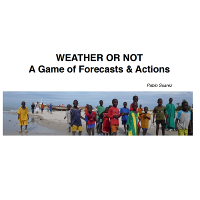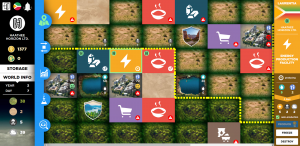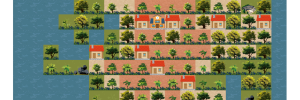Gameplay
Firstly you set up an auditorium style projection with the roulette wheel link ready to play.
Secondly, you organise yourselves into teams and sit in rows.
The first person in the row is the decision maker or the ‘director’ and stands up ready to make the decision.
You spin the roulette wheel to obtain your forecast or percentage of the likelihood of a flood (or other weather events) occurring.
The teams are then given time to discuss what the forecast means, the perceived likelihood of the event occurring, reflect upon experience, share knowledge and exchange individual opinions about whether or not to act on the forecast.
After everyone has been given the chance to discuss their thoughts and opinions, the director decides whether or not to act).
Then you spin the roulette wheel a second time to see the actual outcome.
If the Director chose to act when the forecasted flood did occur or chose not to act and when there was no flood, s/he stays put and retains their position as Director for the next round. If the Director decided to act when the forecasted flood did not occur, then they must sit down and the next person on the team stands up. If the Director chose not to act and there was a flood, this is the biggest punishment for the team. The position of Director misses out three members of the team.
The last team standing wins.
Context
The game is about guessing and making decisions. It is characterized by high uncertainty, because players have to guess whether will be a flood, or not. Also, they need to demonstrate cooperation while deciding. Moreover, the game requires co-operation in a stressful situation.
Target group
Benefits
Increased local awareness of the uncertainty of weather.
Communication between group members or all players.
Enabled understanding of the challenge of adapting to different conditions
The game can highlight the level of understanding of flood prediction and preparedness.
Prelude to discussion and two way knowledge exchange between scientists, policy makers and community members.
Trivia
Discussion around the game also enables the exchange of indigenous sources of weather and climate information. The game can be also played with the series of red cards 1-10 acting as the forecast and the series of black cards 1-10 acting as the outcome.
Created by
Type
Genre
Price
Number of players
Number of moderators
Duration
Materials
deck of cards
Languages
Technical requirements
computer with web connection





